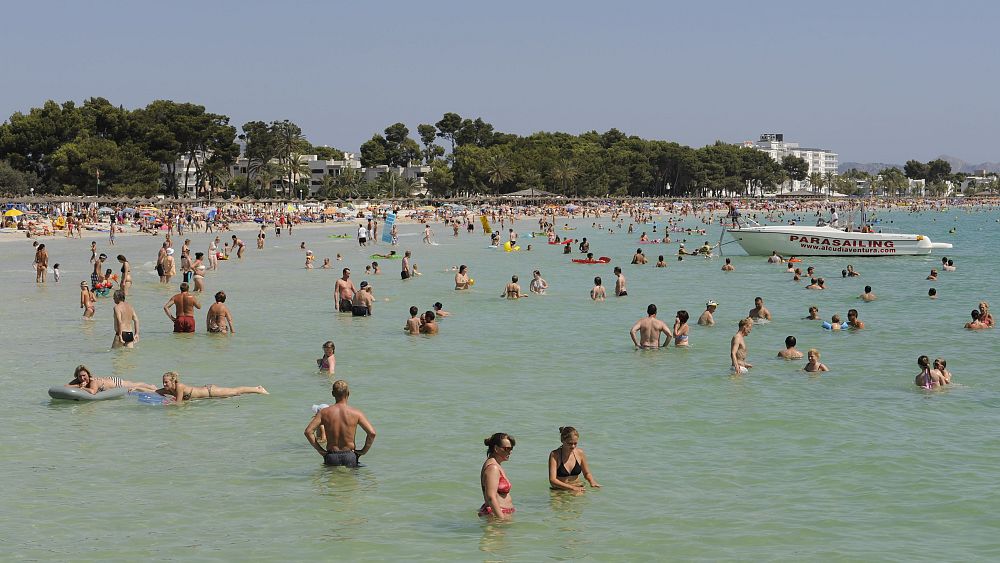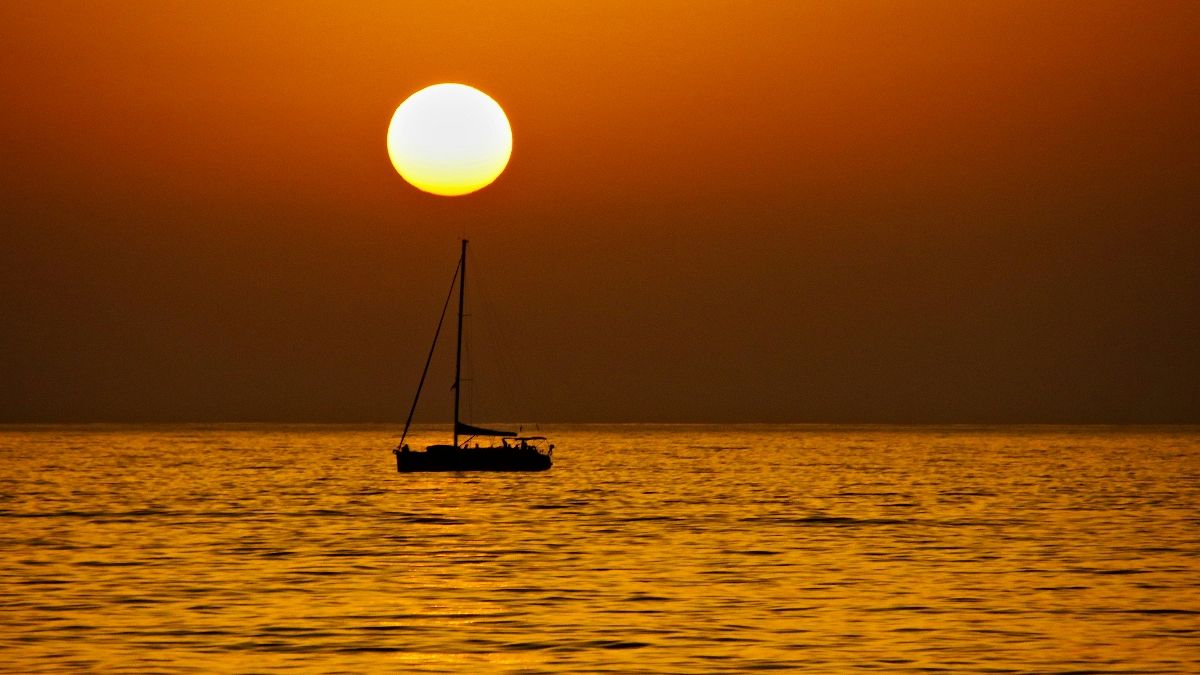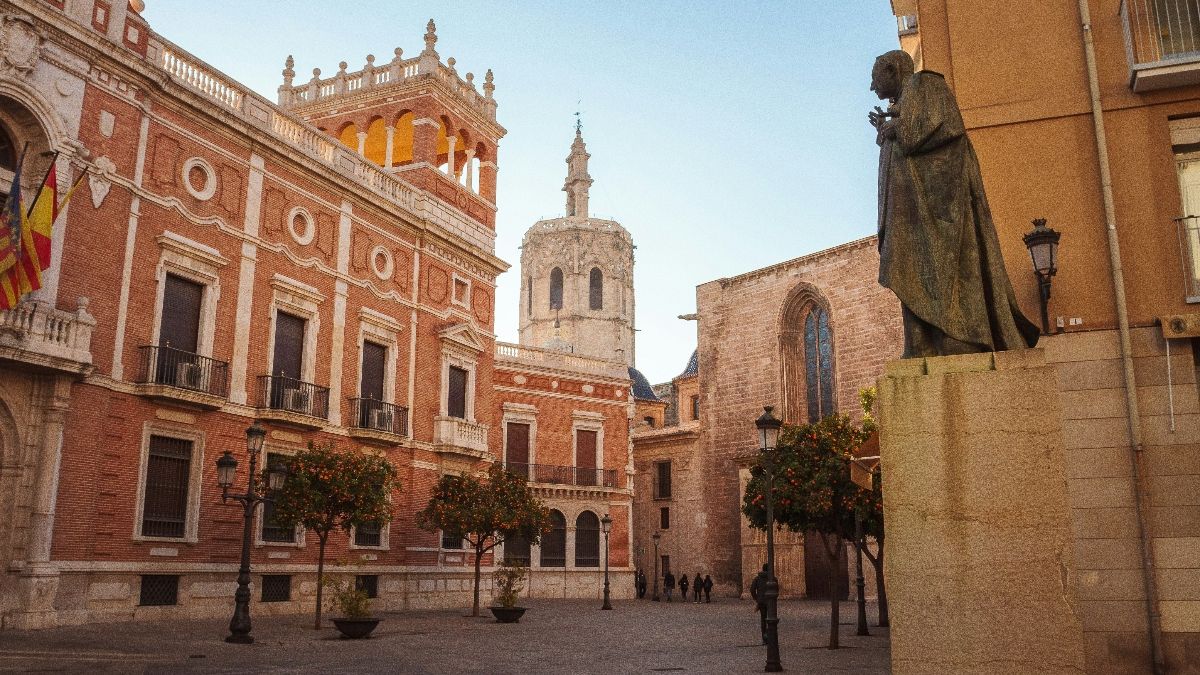Flying north for summer? How heatwaves are changing European holidays

The tourism industry, which makes a significant contribution to Europe’s gross domestic product, could be forever changed in the face of climate change.
In July, thousands of bookings were cancelled in Rhodes after wildfires.
On the Italian island of Sicily, wildfires were much less widespread and they didn’t affect many tourists. But fear of more fires has nonetheless taken its toll on booking numbers.
Italy and Greece are among the EU countries whose economies are particularly strongly reliant on tourism.
A study by the EU Commission study found a clear north-south divide on tourism demand within Europe. But what’s the full picture?
“No decline, but change”
Jean-Pierre Mas, president of the French travel agency association Entreprises de Voyage, disagrees: “There will be no dramatic decline. Instead, there will be a gradual change.
On the one hand, the French, who have suffered a lot from the heat this summer, will try to find slightly less hot destinations, i.e. less towards the south and slightly more towards the north, be it northern France, but also in northern Europe, i.e. destinations where it is not so hot in July and August.
Mauritius, for example, is now the ninth most important summer destination for the French, even though Mauritius has winter in July and August.
But this does not mean that tourism will collapse in countries like Greece, Spain and Italy. The season will not be limited to July and August. It will extend into the spring and autumn.”
Europe is still the most visited region in the world, according to the World Tourism Organisation (UNWTO). In 2020, the continent generated 41 per cent of global tourism income and registered 51 per cent of all international arrivals – the equivalent of 582 million tourists.
**How a German minister caused controversy with a holiday tweet
**
A tweet by German Health Minister Karl Lauterbach while he was on holiday in Tuscany in July made waves in Italy.
“The heat wave is spectacular here,” Lauterbach wrote.
“If it continues like this, these holiday destinations will have no future in the long term. Climate change is destroying southern Europe. An era is coming to an end.”
In his tweet, Lauterbach referred to a European weather map produced by the Helmholtz Climate Initiative.
Italy’s Tourism Minister Daniela Santanchè quickly responded: “I would like to thank the German Health Minister for choosing Italy as a destination, which has always been the favourite holiday destination of his compatriots.
We are sure that Germans will continue to appreciate holidays in Italy,” she said, adding that Italy is aware of climate change, which affects not only southern Europe but the entire planet.
Giuseppe Ciminnisi, the President of the Italian Travel and Tourism Federation, was even more confident. He said, “Certainly tourism has changed in the name of greater sustainability, but as organised tourism businesses, we assure Minister Karl Lauterbach that if he wants to travel further south, for example to Sicily, Puglia, Calabria, he will find it hard to find a place even in this hot climate.”
Italy’s motto: Don’t be alarmed
“The climatic changes will not stop people from going to the sea, the mountains or the lake, experiencing cities that are world heritage sites, discovering new places and trying food that is not available elsewhere,” Ciminnisi tells Euronews Travel. “Since Ulysses, travel in the Mediterranean has been an indispensable factor for human enrichment.”
No abrupt shift from south to north
Nevertheless, holidaymakers in Europe are gradually starting to shift their focus, very slowly but noticeably, says Jean-Pierre Mas.
“This summer, the chosen destinations [of the French] are first Greece, second Spain and third Tunisia, so the three hottest countries, and the Antilles.
Yes, there was an increase in the number of visitors to Scandinavia, for example, and there was an increase in the number of visitors to Hauts de France, the northern part of France, or Alsace for French-speaking tourism. But one cannot say that there has been a movement back from the south to the north.
This movement will be gradual and not all at once, there will be no abrupt process. But tourism professionals in countries like Spain, Greece and Tunisia have to be prepared that visitor numbers will be lower in July or August and certainly higher in June and September in the future.”
“Relatively good summer for Spain, Greece and Italy”
But there is another very simple reason why the southern European tourism industry isn’t so worried: because of how far in advance travellers book their holidays.
Olivier Ponti of consultancy Forward Keys tells Euronews Travel: “I think the situation is encouraging for destinations like Spain, Greece and Italy, which should have a relatively good summer despite everything. Why? Because bookings for the summer season were made in the first half of the year, so current events will mainly affect last-minute bookings, and these make up a minority of bookings.
“So I think travel agents and tour operators in these areas should be able to do good business in the summer. In the most affected places, I’m thinking of places like Rhodes or Sicily, the situation will obviously be more difficult, because there are indeed massive waves of cancellations there, simply because it’s not possible to have a pleasant summer holiday in the current circumstances.”
The prospect of more pleasant summer weather is rather modest: “In general, you have to be prepared for it to get even hotter and drier,” says climate expert Hans-Martin Füssel of the EU Environment Agency EEA in Copenhagen.
“In addition, many of the popular cities in the south are heating up particularly quickly, so their inhabitants themselves are fleeing to the coasts or taking a siesta. In summer, weather conditions in Europe also last longer and longer”, says Füssel. “A heat wave is not over after one, two or three days, but lasts much longer.”
**Americans are still keen on Europe
**
According to the European Travel Commission (ETC), a non-governmental organisation that promotes Europe as a travel destination worldwide, the European travel market is on the upswing. In terms of the number of travellers arriving in Europe, this year has already reached 95 per cent of the 2019 total, ETC says.
High consumer demand is holding up despite stubborn inflation and rising travel costs. This is also due to holidaymakers from the USA, who are benefiting from the favourable exchange rate. According to ETC data, Portugal (+79%), Turkey (+78%) and Montenegro (+43%) are experiencing particularly large increases in tourists from the USA.
In general, the trend is towards countries that are said to offer good value for money. Data from the European Travel Commission up to and including May 2023 shows that four countries in particular are benefitting from lower costs: Serbia (with 27% growth in the current year), Bulgaria (+21%), Montenegro (+12%) and Turkey (+9%).
Source: Euro News














